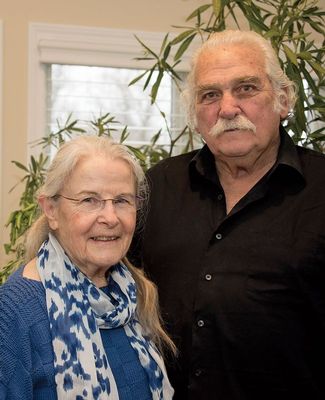Art Form: documentation, preservation, and publication of Michigan traditional arts, folklife, and culture
Location(s): Chelsea (Washtenaw County)
Drs. William "Bill" and Yvonne Lockwood

Portrait of Drs. Yvonne and Bill Lockwood
Dr. William "Bill" G. Lockwood (1933-2017) was a folklorist and anthropologist who studied and documented traditional arts and culture, with a special focus on Balkan and Roma culture. He was Professor of Anthropology department at the University of Michigan from 1969-1997. Dr. Yvonne R. Lockwood is a folklorist and historian known particularly for her study of Finnish Americans, and specifically Finnish rag rugs. She worked as curator of folklife for the Michigan State University Museum and co-founded the Michigan Traditional Arts Program in the mid-1980s. She retired in 2009 and now acts as an independent folklorist.
Throughout their long and distinguished careers, Yvonne and Bill Lockwood documented traditional culture of communities and individuals, providing historical and cultural context, and identifying traditional artists who received local, state, and national recognition for their skill. Although one or the other of the pair has been more associated with a particular group or art form, they often conducted research as a team throughout their married and professional lives. Their collaboration emerged organically as part of their mutual interests in food, ethnicity, and cultural regions like Michigan’s U.P. and the Balkans. Even when pursuing individual fieldwork, they shared their findings with each other for valuable feedback, questions, and critique.
The Lockwoods’ first major fieldwork occurred in what was then Yugoslavia where, from 1966-68, they conducted field research in a Bosnian Muslim village for their Master’s and Doctoral degrees respectively. They were also specialists on these communities here in Michigan. Years later, for example, Bill assisted Laurie Sommers in providing historical context for Alan Lomax’s 1938 field recordings of Detroit Serbians, as part of the Michigan Folksong Legacy Project.
The Lockwoods’ work with Michigan communities began in earnest during the 1970s, after Bill took a position at the University of Michigan. Yvonne taught a folklore course and worked with UM’s Program in Workers Culture, which held a groundbreaking conference in 1981, bringing together labor artists, activists, writers, and performers. She and Bill were part of the conference planning team, and this experience shaped subsequent interest in workers’ culture, especially for Yvonne. This early mutual interest led to presentation of aging Flint Sit-Down Strikers as part of the Michigan Program at the 1987 Smithsonian Festival of American Folklife and its restaging as the first Festival of Michigan Folklife on the MSU campus later that year. It also led, in 1991, to Yvonne joining with John Beck to form MSU’s Our Daily Work, Our Daily Lives, a lecture series that is archived in MSU’s Vincent Voice Library. Yvonne continues to be a leading scholar of Finnish American folklore. Her interest stems from her background as a Finnish American who lived in Ironwood until high school, when her parents moved to California.
Although both Yvonne and Bill are deserving of individual Michigan Heritage Awards, this award recognizes their five decades of teamwork in public and academic folklore in Michigan. Throughout their long collaboration, Yvonne and Bill exemplified academic rigor, an unwavering passion for their subject matter, and a keen interest in the wellbeing of the communities in which they worked. The Lockwoods didn’t take vacations; rather, they went exploring or researching, adding on time before or after conferences, for example, to visit a weaver, or turning a trip to an ethnic market or a new ethnic restaurant into a research opportunity. Their expertise is recognized by peers with various awards from the American Folklore Society, the Finlandia Foundation, and the Beaumier Heritage Center. They stand alone in their work on Michigan foodways and in the traditional culture of the Upper Peninsula. They contributed as fieldworkers, writers, curators, consultants, program directors, and collectors. Our understanding of Michigan’s ethnic, regional, and folk cultures is enriched greatly by their work.
- Laurie Kay Sommers and Ruth Fitzgerald, 2022





